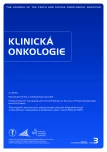Genetic Background of Cisplatin Induced Ototoxicity
Authors:
Michal Jurajda 1
; T. Talach 2; R. Kostřica 2; R. Lakomý 3; I. Kocák 3; M. Cvanová 4
Authors‘ workplace:
Ústav patologické fyziologie, LF MU Brno
1; Klinika otorinolaryngologie a chirurgie hlavy a krku, FN u sv. Anny v Brně
2; Klinika komplexní onkologické péče, MOÚ Brno
3; Institut biostatistiky a analýz, LF a PřF MU Brno
4
Published in:
Klin Onkol 2012; 25(3): 184-187
Category:
Original Articles
Overview
Background:
Cisplatin induced ototoxicity is a serious adverse effect of cisplatin therapy. Cisplatin induced ototoxicity shows significant interindividual variability. This variability is probably based on genetic background. Recent papers describe association of cisplatin ototoxicity with allelic variants of glutathion-S-transferase coding genes.
Patients and Methods:
We have analyzed 55 patients treated with cisplatin therapy without any previous hearing impairment. Audiometric examination was performed before the start of cisplatin therapy and then before and after each cycle of cisplatin. DNA isolated from peripheral blood samples was used to analyze genetic polymorphisms of selected genes coding for glutathion-S-transferases.
Results:
We have demonstrated association of early onset of cisplatin induced hearing impairment with absence of null allele of GSTT1 (p = 0.009). Both GSTM1 gene deletion and single nucleotide polymorphism in GSTP1 gene (rs1695) did not show any association with cisplatin induced ototoxicity.
Conclusion:
Early onset of cisplatin induced hearing impairment is more probable in persons with two functional alleles of GSTT1 gene.
Key words:
cisplatin – ototoxicity – DNA copy number variations – single nucleotide polymorphism
This study supported by grant IGA NS10101-4/2008.
The authors declare they have no potential conflicts of interest concerning drugs, products, or services used in the study.
The Editorial Board declares that the manuscript met the ICMJE “uniform requirements” for biomedical papers.
Submitted:
7. 5. 2012
Accepted:
20. 5. 2012
Sources
1. García-Berrocal JR, Nevado J, Ramírez-Camacho R et al. The anticancer drug cisplatin induces an intrinsic apoptotic pathway inside the inner ear. Br J Pharmacol 2007; 152(7): 1012–1020.
2. Rybak LP. Mechanisms of cisplatin ototoxicity and progress in otoprotection. Curr Opin Otolaryngol Head Neck Surg 2007; 15(5): 364–369.
3. Rybak LP, Mukherjea D, Jajoo S et al. Cisplatin ototoxicity and protection: clinical and experimental studies. Tohoku J Exp Med 2009; 219(3): 177–186.
4. Huang RS, Duan S, Shukla SJ et al. Identification of genetic variants contributing to cisplatin-induced cytotoxicity by use of a genomewide approach. Am J Hum Genet 2007; 81(3): 427–437.
5. Oldenburg J, Kraggerud SM, Cvancarova M et al. Cisplatin-induced long-term hearing impairment is associated with specific glutathione s-transferase genotypes in testicular cancer survivors. J Clin Oncol 2007; 25(6): 708–714.
6. Oldenburg J, Kraggerud SM, Brydøy M et al. Association between long-term neuro-toxicities in testicular cancer survivors and polymorphisms in glutathione-s-transferase-P1 and -M1, a retrospective cross sectional study. J Transl Med 2007; 5 : 70.
7. Peters U, Preisler-Adams S, Hebeisen A et al. Glutathione S-transferase genetic polymorphisms and individual sensitivity to the ototoxic effect of cisplatin. Anticancer Drugs 2000; 11(8): 639–643.
8. Ross CJ, Katzov-Eckert H, Dubé MP et al. Genetic variants in TPMT and COMT are associated with hearing loss in children receiving cisplatin chemotherapy. Nat Genet 2009; 41(12): 1345–1349.
9. Douglas KT. Mechanism of action of glutathione-dependent enzymes. Adv Enzymol Relat Areas Mol Biol 1987; 59 : 103–167.
10. Knight KR, Kraemer DF, Winter C et al. Early changes in auditory function as a result of platinum chemotherapy: use of extended high-frequency audiometry and evoked distortion product otoacoustic emissions. J Clin Oncol 2007; 25(10): 1190–1195.
11. Oldenburg J, Fosså SD, Ikdahl T. Genetic variants associated with cisplatin-induced ototoxicity. Pharmacogenomics 2008; 9(10): 1521–1530.
Labels
Paediatric clinical oncology Surgery Clinical oncologyArticle was published in
Clinical Oncology

2012 Issue 3
- Possibilities of Using Metamizole in the Treatment of Acute Primary Headaches
- Metamizole at a Glance and in Practice – Effective Non-Opioid Analgesic for All Ages
- Metamizole vs. Tramadol in Postoperative Analgesia
- Spasmolytic Effect of Metamizole
- Safety and Tolerance of Metamizole in Postoperative Analgesia in Children
-
All articles in this issue
- New and Clinically Used Oncomarkers of Bladder Cancer
- Reproductive Functions in Women after Cancer Therapy
- Genetic Background of Cisplatin Induced Ototoxicity
- Triple-Negative Breast Cancer: Analysis of Patients Diagnosed and/or Treated at the Masaryk Memorial Cancer Institute between 2004 and 2009
- Angioimmunoblastic T-cell Lymphoma as a Very Poor-Prognosis Malignancy – a Single Centre Experience
- Patient with B-CLL with a History of Unrelated Hematopoietic Cells Donation – Retrospective Analysis of CLL Development and Implication for the Recipient
- Benefits of Individual Imaging Methods for Diagnosis and Monitoring of Activity of Multiple Myeloma
- Positron Emission Tomography and Clinical Predictors of Survival in Primary Extragonadal Germ Cell Tumors
- Granulocyte-Colony Stimulating Factor (G-CSF) Accelerates Healing of Radiation Induced Moist Desquamation of the Skin
- Clinical Oncology
- Journal archive
- Current issue
- About the journal
Most read in this issue
- Angioimmunoblastic T-cell Lymphoma as a Very Poor-Prognosis Malignancy – a Single Centre Experience
- Triple-Negative Breast Cancer: Analysis of Patients Diagnosed and/or Treated at the Masaryk Memorial Cancer Institute between 2004 and 2009
- New and Clinically Used Oncomarkers of Bladder Cancer
- Granulocyte-Colony Stimulating Factor (G-CSF) Accelerates Healing of Radiation Induced Moist Desquamation of the Skin
